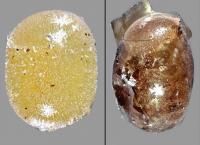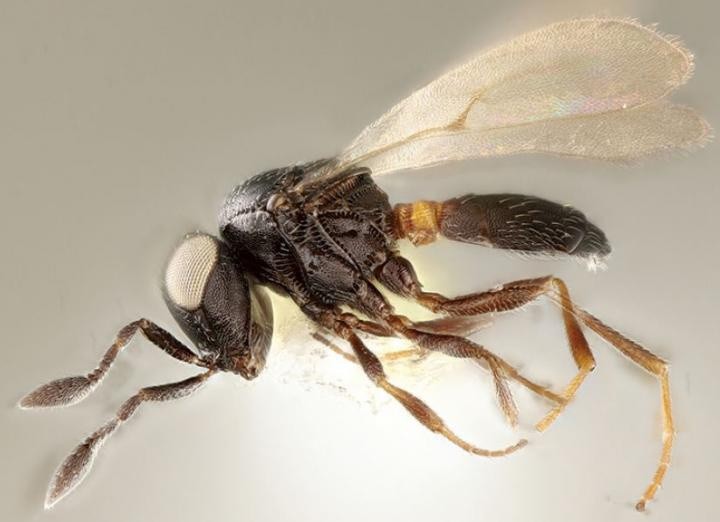

A parasitic wasp was recently discovered in Guanajuato, Mexico, where it was found to parasitize the eggs of an invasive stink bug, known as the bagrada bug, which is a major pest of cruciferous vegetables. A research team from Colegio de Postgraduados (Mexico), Agriculture and Agri-Food Canada (AAFC) and the Florida State Collection of Arthropods (FSCA) collaborated to publish a study on the biology this species, Idris elba, and describe it as a species new to science.
The genus Idris was described in 1856 and now contains over 300 species and many more species are still undescribed. Species of Idris were previously known to only parasitize spider eggs. It was thus very unexpected when specimens of Idris were found to emerge from eggs of the bagrada bug by Dr. Refugio Lomeli-Flores and his team in Guanajuato. Advanced methods in molecular forensics were used by Dr. Tara Gariepy (AAFC) to match the DNA of the adult wasp with DNA left behind in the stink bug egg from which it emerged, independently confirming the results. The specimens were then sent to taxonomist, Dr. Elijah Talamas (FSCA), who determined that it was an undescribed species.
The discovery of this wasp marks an important step toward the development of efficient and natural control of the stink bug species Bagrada hilaris in North America. Commonly known as the bagrada bug, it is native to Africa, but is already an established and important pest of over 74 plant species in India, southern Europe, southern Asia and the Middle East. Across the Atlantic, it has been known since 2008, when it was reported from Los Angeles, California (USA), followed by records from Coahuila state, Mexico, in 2014. Three years later, it was also found in the state of Guanajuato, which is responsible for over 70% of the country's broccoli production, as well as the major import of broccoli and cauliflower in the USA and Canada. So far, measures to halt the bug's invasion have proven largely ineffective, and its distribution is expected to reach new ecosystems of economical importance.
While not unheard of, it is uncommon for native parasitoids to attack an introduced host. Idris elba is exceptional because it demonstrates that these wasps can make the leap from parasitizing the eggs of spiders to the eggs of stink bugs. Having rejected the possibility of the species having been introduced alongside its host, the scientists note that the unexpected association could be either the result of a broad host range, or a case of lucky confusion, where the parasitoid tends to mistake the eggs of the stink bug for those of a spider.
It is no coincidence that this wasp has the species name "elba". Dr. Talamas explained that explicitly naming the species after Idris Elba (the actor), also known as a patronym, would have to follow Latin grammar and become Idris elbai. By treating the second name as an arbitrary combination of letters, the grammar was avoided.
Four-time Golden Globe nominee for Best Actor, Idris Elba is a famous British actor, producer, writer, singer, DJ and producer, best known for a long list of blockbusters, including a good number of superhero movies, such as the Marvel series inspired by the myths of the Norse god Thor. There, Elba stars as Heimdall, whose almost namesake: Heimdallr, is a Norse deity believed to be the sole protector of the bridge linking the human world and the realm of the gods.
© 2025 NatureWorldNews.com All rights reserved. Do not reproduce without permission.





